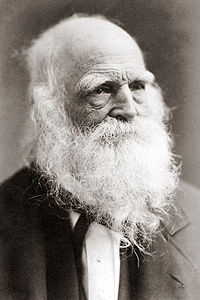An Indian Story
William Cullen Bryant 1794 (Cummington) – 1878 (New York City)
'I know where the timid fawn abides
In the depths of the shaded dell,
Where the leaves are broad and the thicket hides,
With its many stems and its tangled sides,
From the eye of the hunter well.
'I know where the young May violet grows,
In its lone and lowly nook,
On the mossy bank, where the larch-tree throws
Its broad dark boughs, in solemn repose,
Far over the silent brook.
'And that timid fawn starts not with fear
When I steal to her secret bower;
And that young May violet to me is dear,
And I visit the silent streamlet near,
To look on the lovely flower.'
Thus Maquon sings as he lightly walks
To the hunting-ground on the hills;
'Tis a song of his maid of the woods and rocks,
With her bright black eyes and long black locks,
And voice like the music of rills.
He goes to the chase--but evil eyes
Are at watch in the thicker shades;
For she was lovely that smiled on his sighs,
And he bore, from a hundred lovers, his prize,
The flower of the forest maids.
The boughs in the morning wind are stirred,
And the woods their song renew,
With the early carol of many a bird,
And the quickened tune of the streamlet heard
Where the hazels trickle with dew.
And Maquon has promised his dark-haired maid,
Ere eve shall redden the sky,
A good red deer from the forest shade,
That bounds with the herd through grove and glade,
At her cabin-door shall lie.
The hollow woods, in the setting sun,
Ring shrill with the fire-bird's lay;
And Maquon's sylvan labours are done,
And his shafts are spent, but the spoil they won
He bears on his homeward way.
He stops near his bower--his eye perceives
Strange traces along the ground--
At once to the earth his burden he heaves,
He breaks through the veil of boughs and leaves,
And gains its door with a bound.
But the vines are torn on its walls that leant,
And all from the young shrubs there
By struggling hands have the leaves been rent,
And there hangs on the sassafras, broken and bent,
One tress of the well-known hair.
But where is she who, at this calm hour,
Ever watched his coming to see?
She is not at the door, nor yet in the bower;
He calls--but he only hears on the flower
The hum of the laden bee.
It is not a time for idle grief,
Nor a time for tears to flow;
The horror that freezes his limbs is brief--
He grasps his war-axe and bow, and a sheaf
Of darts made sharp for the foe.
And he looks for the print of the ruffian's feet,
Where he bore the maiden away;
And he darts on the fatal path more fleet
Than the blast that hurries the vapour and sleet
O'er the wild November day.
'Twas early summer when Maquon's bride
Was stolen away from his door;
But at length the maples in crimson are dyed,
And the grape is black on the cabin side,--
And she smiles at his hearth once more.
But far in the pine-grove, dark and cold,
Where the yellow leaf falls not,
Nor the autumn shines in scarlet and gold,
There lies a hillock of fresh dark mould,
In the deepest gloom of the spot.
And the Indian girls, that pass that way,
Point out the ravisher's grave;
'And how soon to the bower she loved,' they say,
'Returned the maid that was borne away
From Maquon, the fond and the brave.'
Font size:
Submitted on May 13, 2011
Modified on March 05, 2023
- 3:02 min read
- 67 Views
Quick analysis:
| Scheme | ABAAB CDCCD EFEEF XXGGA HIHHI JKJJK LMLLM NONNO PQPPQ XRSSR FTFFT UVUUV WOWWO XYXXY Z1 ZZ1 O2 OO2 |
|---|---|
| Closest metre | Iambic pentameter |
| Characters | 3,063 |
| Words | 606 |
| Stanzas | 16 |
| Stanza Lengths | 5, 5, 5, 5, 5, 5, 5, 5, 5, 5, 5, 5, 5, 5, 5, 5 |
Translation
Find a translation for this poem in other languages:
Select another language:
- - Select -
- 简体中文 (Chinese - Simplified)
- 繁體中文 (Chinese - Traditional)
- Español (Spanish)
- Esperanto (Esperanto)
- 日本語 (Japanese)
- Português (Portuguese)
- Deutsch (German)
- العربية (Arabic)
- Français (French)
- Русский (Russian)
- ಕನ್ನಡ (Kannada)
- 한국어 (Korean)
- עברית (Hebrew)
- Gaeilge (Irish)
- Українська (Ukrainian)
- اردو (Urdu)
- Magyar (Hungarian)
- मानक हिन्दी (Hindi)
- Indonesia (Indonesian)
- Italiano (Italian)
- தமிழ் (Tamil)
- Türkçe (Turkish)
- తెలుగు (Telugu)
- ภาษาไทย (Thai)
- Tiếng Việt (Vietnamese)
- Čeština (Czech)
- Polski (Polish)
- Bahasa Indonesia (Indonesian)
- Românește (Romanian)
- Nederlands (Dutch)
- Ελληνικά (Greek)
- Latinum (Latin)
- Svenska (Swedish)
- Dansk (Danish)
- Suomi (Finnish)
- فارسی (Persian)
- ייִדיש (Yiddish)
- հայերեն (Armenian)
- Norsk (Norwegian)
- English (English)
Citation
Use the citation below to add this poem to your bibliography:
Style:MLAChicagoAPA
"An Indian Story" Poetry.com. STANDS4 LLC, 2024. Web. 26 Apr. 2024. <https://www.poetry.com/poem/40275/an-indian-story>.



Discuss the poem An Indian Story with the community...
Report Comment
We're doing our best to make sure our content is useful, accurate and safe.
If by any chance you spot an inappropriate comment while navigating through our website please use this form to let us know, and we'll take care of it shortly.
Attachment
You need to be logged in to favorite.
Log In